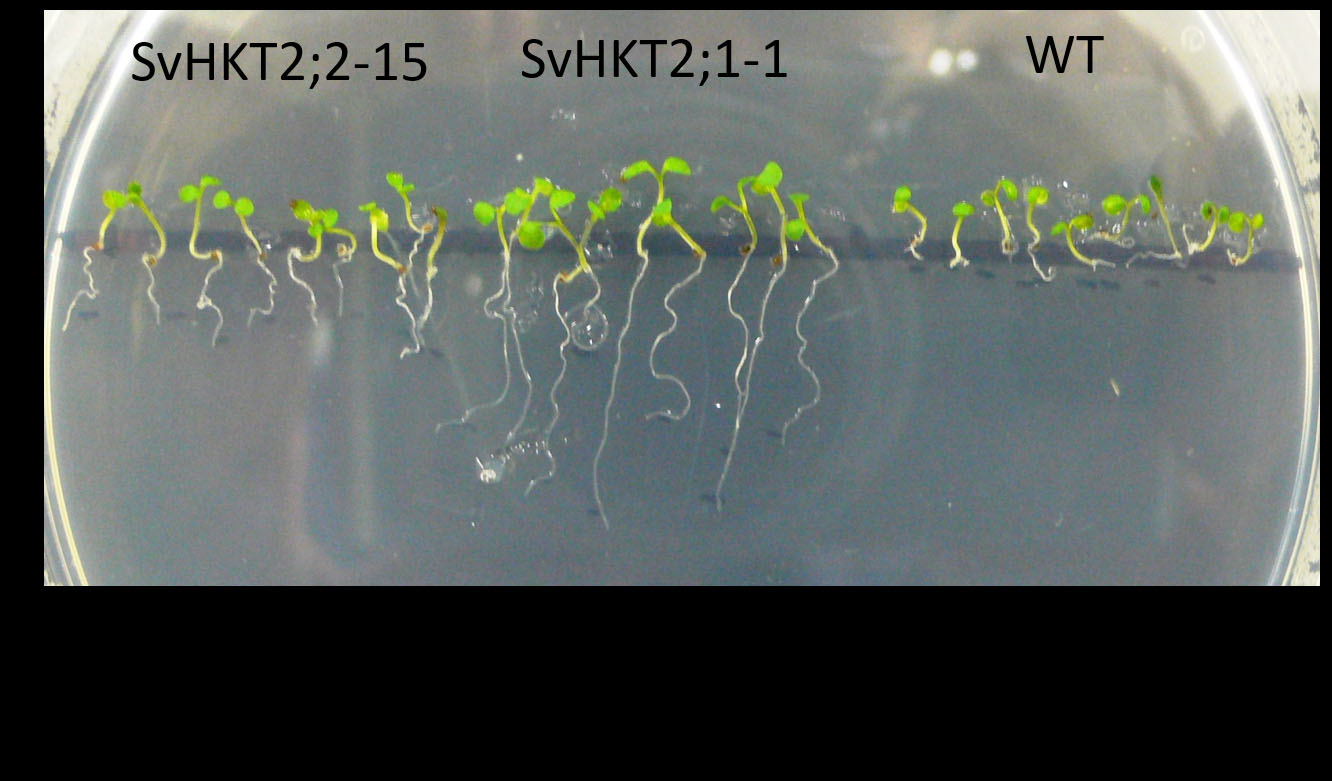Plant Biotechnology Laboratory
Resolving environmental problems and enriching our lives by utilizing plants
We are conducting research to use or improve the function of plants to solve agricultural and environmental problems, including food shortage and desertification.
Research topics
– Analysis of salt tolerance mechanisms in plants, especially functional analysis of potassium transporters, using wild turf grass and mangrove plants as materials.
– Analysis of drought tolerance mechanisms in plants
– Phytoremediation, especially production of formaldehyde-detoxifying plants
We have identified potassium transporters from S. virginicus, which mediate potassium transport from roots to shoots. These proteins could contribute to the production of salt tolerant plants, and also plants not requiring potassium as a fertilizer. We are working on the identification and functional analysis of the proteins which are responsible for potassium/sodium transport in plants, especially wild turf grasses.

Fig. 1 Growth of Arabidopsis expressing genes for potassium transporters from S. virginicus on K+-starved medium.
————————————————————————————-
The origins of halophytes are multi-sourced, and halophytes are contained in plants of various species, genera, and families. They have different salt tolerance mechanisms although some are common to each halophyte. In general, the salt tolerance mechanism consists of management of toxic sodium ions, regulation of osmotic pressure, and response to active oxygen generated secondarily. Among these, management of sodium ions is the most important. High affinity potassium transporter 1 (HKT1) is a sodium monoporter despite its name and involved in sodium transport and absorption in plant. HKT1s play important roles in salt tolerance. It suppresses the sodium transport from roots to shoots by recovering sodium from root xylem and reduce sodium content in shoots by uploading sodium into shoot phloem and translocating sodium to roots in both glycophytes and halophytes. Furthermore, HKT1s in halophytic relatives of Arabidopsis also mediate potassium transport and mutations in these genes reduces their salt tolerance. We also reported that SvHKT1;1 from halophytic turf glass plays an important role in Na regulation (Kawakami et al. 2020, Int J Mol Sci). In addition, it has been reported that HKT2s, Na+–K+ symporters from the turfgrass, are involved in the regulation of salt tolerance by transporting potassium and sodium in the plant (Tada et al. 2018, Plant Cell Physiol). Maintaining potassium homeostasis or the K/Na ratio in plant is also a trait that greatly contributes to salt tolerance. HKTs are found to have great diversity in nucleotide sequences, expression characteristics, copy numbers, etc. between halophytes and glycophytes, but great diversity has also been reported among glycophytes. On the other hand, it has been reported that, in the salt-tolerant wild species of tomato, Na+–K+ transporter (HAK20) and Na/H antiporter (SOS1) that excretes intracellular sodium to the intercellular space and roots have a great influence on salt tolerance (Wang et al. 2020, EMBO J; Wang et al. 2020, Plant Biotechnol J). This also indicates that sodium management in plants is important for salt tolerance. These reports suggested that the ion selectivity and expression characteristics of sodium and/or potassium transporter proteins greatly influence the degree of salt tolerance. We believe that duplication of the potassium/sodium transporter genes in glycophytes followed by mutations in the coding and promoter regions are the origin of halophytes, and we would like to test this hypothesis.
———————————————————————————————
We are seeking graduate students to analyze the functions of potassium transporters in plants.
Contact: tadayui@stf.teu.ac.jp
Admissions Information
Link to Research Gate page (3) Yuichi Tada (researchgate.net)
Link to Google Scholar page 多田雄一 – Google Scholar
Link to Scopus page Scopus preview – Tada, Yuichi – 著者詳細 – Scopus

